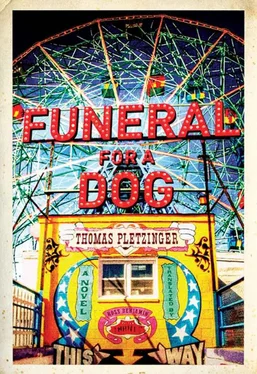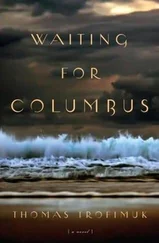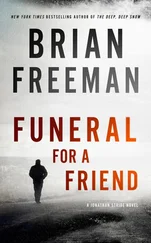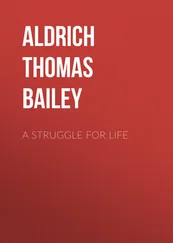Attenti al Cane!
I’m sitting at the end of the Via San Rocco in front of my last bile and my inability to leave (coffee and soul), when Tuuli is suddenly standing next to me. The boy behind her seems intimidated by the sight of the helpless man (Mandelkern). She’s holding a black garbage bag in her hand. My body’s acting crazy, I say to Tuuli between two retches, an influenzal infection maybe. We would definitely detect a fever, I say, but then I can’t go on talking because I have to gag (one has a high temperature when the body is fighting something, says Elisabeth). When not even bile is coming up anymore, Tuuli tosses the garbage bag into the heap and hands me a handkerchief:
It’ll be over soon, Manteli
she says, I already thought you’d left without a word. No, I say, wishing I weren’t sitting in front of my own vomit. The boy observes me and his mother (her hand on the back of my head). Of course I would have said good-bye, I say, if I’d left, for me politeness is a cardinal virtue (where am I now getting such words?). Tuuli laughs, the boy doesn’t. Bile, says Tuuli, is produced in the duodenum, Manteli (such facts, such details). Then she lays her hand on my back. I will stay. I have to take a closer look at Tuuli, I think, I want to see behind Svensson’s stories, I have to ask her.
Samy! Antakaa hänelle vesipullo!
says Tuuli with her small hand on the nape of my neck. The boy holds a bottle of water out to me, and I rinse the sourness out of my mouth. We slowly walk deeper into the woods, back to Svensson’s house, back to his pictures, his animals, his stories (sometimes people find themselves on a journey together: we arrived together, we could leave together).
my curiosity
Back in my room Tuuli holds the thermometer up to the light (her gap-toothed smile). She says, 36.7º might seem slightly low, but it’s completely normal for an adult body, even in this heat. Do you usually smoke as much as you did yesterday, Manteli ? No? I’m lying on my back in Svensson’s room, Tuuli puts the boy’s thermometer back in the light blue plastic case (Thermex for Kids). There are no viruses involved, Manteli , she says, it’s not an infection and nothing bacterial. Tuuli gets up and leaves my room, it must be your curiosity, Karvasmanteli .
William Wordsworth vs. Robby Naish
I TURN THE RADIO DIAL AND SAY TO THE PADRE: FOR DAYS THEY’VE been playing nothing but forró here. Urinating is good for you, the padre replies, stopping the car. He leaves the engine running, gets out and pisses on a horse corpse on the roadside, his piss drums on the swollen belly like rain on a car roof. But for days it hasn’t rained, for days Tuuli and I haven’t understood a word, for days there’s been no sign of Felix. Tuuli is lying on the backseat and sleeping, sometimes I turn around and observe Tuuli and her sleep, curled up and her mouth slightly open. I wonder whether Felix was arrested, I wonder how the Seraverde prison smells, I wonder how we can get him out of there. And whether we can at all. For days I’ve been seeing Felix in every cactus on the roadside, in every desert dog, in every palm tree. Felix speaks my language, Felix understands me. Get away from here and recover, he said, and sat us in the padre’s Peugeot on Sunday afternoon, you guys go along on the donation tour, then things will look different before long, you’ll get to know the country and people, don’t forget your passports! I’ll stay here, I’ll deal with the police and the dog, we’ll meet on Sunday in Tupanatinga on the BR-232, Pousada Majestic. Then we’ll see the country, desert and rain forest and sea, the seleção and cockfighting. So for days I’ve been sitting in the passenger seat of the Peugeot 405 and counting cacti, 517, 518. Sometimes Tuuli wakes up and rolls a cigarette, sometimes she tells stories from Finland, sometimes she touches me with all due caution. For days we’ve been listening to forró and watching the padre drink, for days the padre has been buying gas and a cooler full of water in the morning at some gas station. I drink with him, because without Felix I’m not touching a sip of alcohol. The padre takes off his cap, crosses himself and puts the cap back on. We drive through the steppe, sertão, until dusk, we stop every afternoon and every evening in a different village, Itaporanga, Sera Bonita, Guanumbi. I’ve forgotten the days of the week. I stand next to the padre and piss on the corpse too.
I paint my world in the darkest colors. The black horse, I think, the second corpse. For days I’ve been seeing the dark blood of the district policeman and city council candidate oozing. For days I’ve been explaining to the padre what happened. Santos was lying outside the door, I say, his abdominal wall shot off, blood everywhere, on the steps, on the wall, on the iron door. But the padre with his right hand on the priestly cock isn’t listening, he’s rolling his hips as if he were dancing the limbo. He’s trying to hit the flies on the horse’s milky eyes, with his left hand he adjusts his cap. José Santos Tourão Splitter had pissed all over himself, I say, from a frayed hole in the middle of his belly flowed light blood. José Santos Tourão Splitter? asks the padre, Partido dos Trabalhadores? I haven’t drunk enough water to keep up with the padre, he shakes his cock. Safado , says the padre, buttoning his pants. His chest hairs were stuck together, I recount, like gulls’ feathers in oil. Santos was lying in his blood and looking at us, someone had left him on the doorstep, the tracks of the donkey cart could still be seen. The padre takes a cold chicken leg from yesterday out of the cooler and strolls around the Peugeot. We lifted him onto the pickup, I say, following the padre, we drove him to the hospital, we got there too late, the man was dead! His dog was injured too, we don’t know whether he’s pulled through. We amputated his leg with the bolt cutter. We don’t know how the Seraverde vote was decided, who has won the elections and who has survived. We don’t know anything! The padre climbs into the Peugeot and gnaws at the chicken leg. Do you know Lula? I ask the padre. The padre smiles, Tuuli’s still sleeping. I thought this was peace service in deprived areas of Latin America, I say to the padre, and the padre says, urinating is good for you.
The horse corpse is shining, the car is parked on the roadside in the middle of the desert, then the padre engages a gear and things go on as they have been for days, on the right and left cacti, now and then a rocky hill, then hours of steppe, occasionally an intersection, occasionally an armadillo, occasionally a road sign. The names mean nothing to me, I don’t know where I am or where we’re going. Tuuli has even less of a clue, she just closes her eyes and sleeps, her hands folded into a pillow. The padre throws the chicken leg out the window, the car lurches to the left and lurches to the right, in the rearview mirror the black horse is lying on the roadside, and I take another bottle of water out of the cooler. Where are we actually going, I ask the padre, and are you even listening to me? Sim , says the padre, shaking his head. He takes his hands off the steering wheel and nods toward the backseat, he traces a curvy silhouette of a woman in the air and winks at me. The church doesn’t understand me, I think. Is Santos really dead? Felix asked the doctor in the state hospital. Election night here is Sodom and Gomorrah, she replied, stubbing out her cigarette, we can’t save everyone. So I ask the padre whether salvation exists, and the padre points to the horizon, Tupanatinga, he replies. For days the padre starts talking and singing around noon, Tuuli and I can’t follow his song and talk. He never gets tired, the padre might be saying, he can always drive straight through the desert. In two hours it’s lunchtime in Tupanatinga, we believe we understand, he has to sleep there, and the mayor is a friend. In every town the padre has a friend, in Sera Bonita the chicken grills are fired up, in Itaporanga the beans are cooking, in Macarimba the donation managers are waiting. Saúde! the padre laughs, throwing a water bottle out the window, mais uma água! I turn the radio back on. Still forró . The sun shows three o’clock, Tuuli talks to me only at night. Five hundred twenty cacti are a lot of cacti, I say to the padre, next to the horse corpse there were three tall, thin, flowerless ones.
Читать дальше












